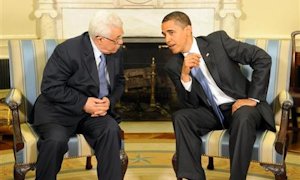By Pinhas Inbari
The re-election of Barack Obama begs the question whether, as he had done in his first term, the US president would focus his attention on the Israeli-Palestinian conflict. While the resolution of the conflict was high on the administration’s agenda four years ago, that is no longer the case.
Obama II will certainly address the Palestinian issue, but not with the same vigor and determination that characterized the first term.
 The president will undoubtedly not abandon the Palestinian issue for it is dear to his heart and personal ideology. Furthermore, Obama has made promises to PLO leader Mahmoud Abbas to give the Palestinian cause serious consideration in exchange for the Palestinians delaying their unilateral bid for statehood at the United Nations.
The president will undoubtedly not abandon the Palestinian issue for it is dear to his heart and personal ideology. Furthermore, Obama has made promises to PLO leader Mahmoud Abbas to give the Palestinian cause serious consideration in exchange for the Palestinians delaying their unilateral bid for statehood at the United Nations.
Moreover, the ongoing election campaign in Israel promises to put the Palestinian problem squarely on the table. Israeli politicians, especially those on the left, expect Obama to pronounce himself on the issue, without, however, going as far as intervening in the election. A silence on his part would be met with raised eyebrows.
However, it is difficult to determine whether the administration’s likely symbolic gestures will transform into concrete foreign policy. When President Obama was first elected, Mahmoud Abbas was the first world leader to receive a phone call from the newly minted president. Obama sealed his support by enabling Abbas to hold the Sixth Fatah Congress in Bethlehem, which was meant to serve as a launching pad for the Palestinian statehood project.
Yet, with the World Bank confirming the Palestinian Authority’s inability to establish viable infrastructure and Fatah’s failure to win in local elections, it is unlikely that the president would risk backing the creation of yet another failed state in the Middle East. At best, Obama may help save the Palestinian Authority from collapse by urging Israel to restrict settlement building, which Israel has already largely limited to big settlement blocks.
The administration is likely to continue its line of opposition to the unilateral creation of a Palestinian state at the UN, as any move in that regard would signify major engagement on the Palestinian front. The unilateral approach would also deprive the administration of the opportunity to serve as a mediator and gain international diplomatic clout.
Most revealingly, President Obama spoke of the need to mend the wounds of the"American family" in his victory speech and therefore focus on America’s domestic needs. With both houses of the US Congress strongly behind Israel, it is hard to imagine that the president would choose to ignore the wide bipartisan support of Israel and indulge his personal desires vis à vis the Palestinians, especially in light of the Middle East’s preoccupation with the post-Arab Spring reality.







